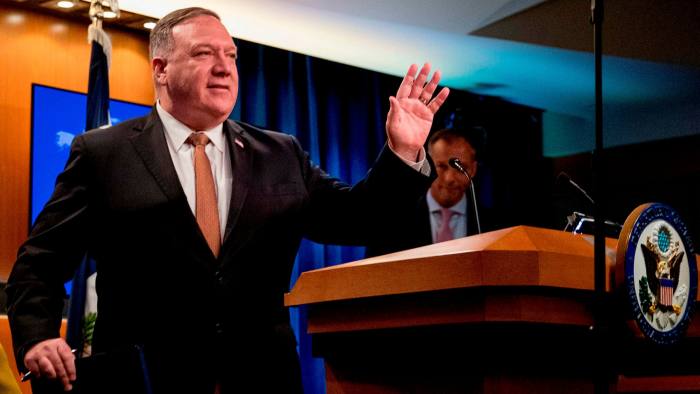US slaps visa restrictions on Huawei employees as it considers further moves against Chinese companies

A few minutes every morning is all you need.
Stay up to date on the world's Headlines and Human Stories. It's fun, it's factual, it's fluff-free.
United States Secretary of State Mike Pompeo declared on Wednesday that the US would impose visa restrictions on employees of Huawei Technologies Co. Ltd. and other Chinese firms for their roles in supporting human rights violations.
Pompeo told reporters in Washington that, “The State Department will impose visa restrictions on certain employees of Chinese technology companies like Huawei that provide material support to regimes engaging in human rights violations and abuses globally.
“Telecommunications companies around the world should consider themselves on notice: If they are doing business with Huawei, they are doing business with human rights abusers,” stated Pompeo.
Although he did not provide further details on targeted employees or the scope of the restrictions, this move is symbolic of the company’s growing troubles with the US and its efforts to crack down on Huawei’s reach.
TikTok could be next
The US has long argued that Huawei technologies could be providing sensitive information and channels for spyware to the Chinese government, something the company has fiercely denied.
“We are disappointed by this unfair and arbitrary action to restrict visas of our employees who work tirelessly to contribute to technological innovation in the US and around the world,” said Huawei spokesman Rob Manfredo.
As tensions rise between the two superpowers, Washington officials also said that in the coming weeks they would be assessing security risks posed by other Chinese companies, including popular social media platforms TikTok and WeChat.
“There are a number of … administration officials who are looking at the national security risk as it related to TikTok, WeChat and other apps that have the potential for national security exposure, specifically as it relates to the gathering of information on American citizens by a foreign adversary,” said White House Chief of Staff Mark Meadows.
TikTok is owned by Chinese-based company ByteDance Ltd., which has repeatedly stressed that TikTok functions independently from its mainland China counterpart Douyin.
“TikTok has an American CEO, a Chief Information Security Officer with decades of U.S. military and law enforcement experience, and a growing US team that works diligently to develop a best-in-class security infrastructure,” they said in a statement. The company, led by former Walt Disney Co. executive Kevin Mayer, also said that its user data is stored in Virginia and Singapore.
When asked on Wednesday about US decisions on Chinese companies, Pompeo said that the Trump administration hopes to have a set of decisions shortly.
“Whether it is TikTok or any of the other Chinese communications platforms, apps, infrastructure, this administration is taking seriously the requirement to protect the American people from having their information end up in the hands of the Chinese Communist Party,” he declared.
Pompeo added that while the US is still having conversations with Beijing, “we have to deal with China as it is, not as we wish it to be.”
As the US moves to crack down on Huawei so are its political allies
US President Donald Trump told reporters on Tuesday, “We convinced many countries, many countries – I did this myself for the most part – not to use Huawei, because we think it’s an unsafe security risk.
“I talked many countries out of using it: if they want to do business with us, they can’t use it,” Trump said, following the United Kingdom’s announcement on the same day that they would be removing Huawei technologies from their 5G network.
Other members of the Five Eyes intelligence alliance – which is made up of the US, UK, Canada, Australia and New Zealand – have, with the exception of Canada, also enforced similar restrictions against Huawei over security concerns.
However, while Canada has not announced any bans or sanctions against the company, they have stuck by their southern neighbor and are engaged in a separate conflict with Huawei.
Acting on a US extradition warrant in 2018, Canadian authorities arrested Huawei Chief Financial Officer Meng Wanzhou for lying about the company’s business dealings with Iran and circumventing heavy US sanctions on the country. This has since led to the detainment of two Canadian citizens in China in retaliation, and an ongoing standoff between the Chinese and Canadian governments.
These moves against Chinese companies are the latest in a growing list of US countermeasures against China’s abuse of human rights, particularly with regards to the detainment of Muslim populations in the Xinjiang region and encroachment on Hong Kong’s autonomy.
On Tuesday, President Trump officially ended Hong Kong’s special status as independent from China and signed a bill into law that would sanction Chinese officials and entities responsible for undermining the city’s freedoms.
Pompeo expressed US determination to stand up to China on security and human rights grounds saying, “President Trump has told our team that we need to do everything we can to push back.”
Have a tip or story? Get in touch with our reporters at tips@themilsource.com




Comments ()